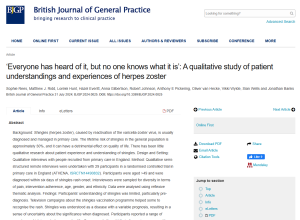Patients’ understanding of shingles is poor with some blaming themselves for its onset, study finds
14 January 2025
A study by researchers at the University of Bristol exploring patients’ understanding and experience of shingles has found that many had a limited understanding of the illness before diagnosis and were unprepared for the symptoms they experienced. Health care professionals highlighted stress as a trigger for shingles which led some people to blame themselves for its onset.
Shingles is a painful condition caused by the reactivation of the herpes zoster (chickenpox) virus. It is usually characterised by a distinctive rash. While there is a 30 per cent likelihood among the general population of developing shingles in a lifetime, many people have a limited understanding of the disease until they face it themselves.
Conducted as part of the National Institute for Health and Care Research (NIHR) funded ATHENA trial, which is investigating whether taking the drug amitriptyline can stop long-term pain from shingles, the study involved interviews with 29 participants aged 50-89 (14 women and 15 men) in primary care settings across England. Three of the participants had received the shingles vaccine, which can reduce the risk of getting shingles or make the symptoms much milder.
Despite being aware of the disease, most participants felt they knew very little about shingles before their diagnosis. Many did not know that shingles can reoccur or occur after vaccination.
The study also found that:
- While public awareness campaigns about the shingles vaccine helped some recognise symptoms early, many did not think their rash related to shingles.
- The reasons for reactivation of the herpes zoster virus and the onset of shingles are varied and often associated with age. However, the link with stress tended to become the dominant explanation which led patients to blame themselves and prompted many to reflect on their lifestyle, age, and mental wellbeing, with some making significant life changes, such as retiring from work.
- Shingles brought a sense of uncertainty about the future, with varying symptoms and recovery times causing additional stress.
Dr Sophie Rees, Research Fellow at Bristol Trials Centre and lead author of the study, said:
“Shingles is more than just a rash. It brings a range of symptoms that can severely affect daily life. Pain, mood changes, and disruptions to social and recreational activities were commonly reported.
“Patients need clear information about shingles to help them understand the disease and seek timely treatment. Recognising the emotional and psychological impact of shingles is also crucial. Health professionals should reassure patients that shingles is not their fault and should not be a source of shame.
“Future research should investigate shingles in more diverse populations and explore the connections between stress, mental health, and shingles.”
Dr Jonathan Banks, Senior Research Fellow at the Centre for Academic Primary Care, University of Bristol and NIHR Applied Research Collaboration West (NIHR ARC West), said:
“The triggers for shingles onset are varied and not fully understood. Health care professionals should treat the role of stress in shingles with caution as it can lead to excessive self-blame.”
Paper
